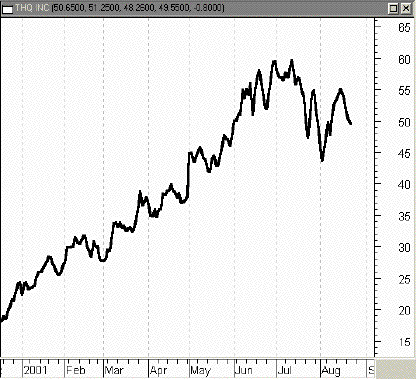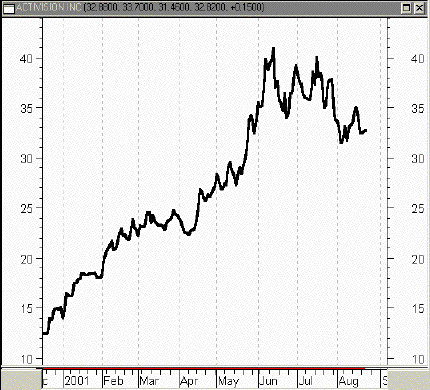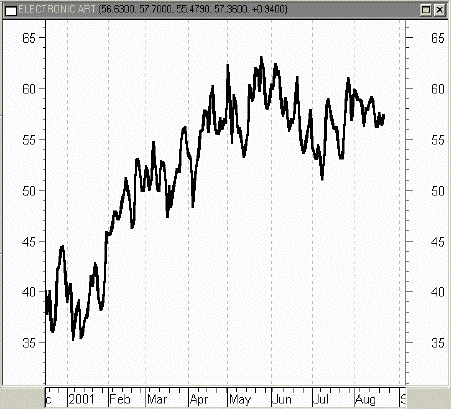
HOT TOPICS LIST
- Strategies
- Stocks
- Buy
- Investing
- Brokers
- Psychology
- Interviews
- Accumulate
- Sell
- Hold
- Spotlight
- Websites
- Candlestick Corner
- Gold & Metals
- Options Trading
LIST OF TOPICS
SPOTLIGHT
Gaming Grows Up
09/28/01 03:14:59 PM PSTby David Penn
Some of the best news in technology may be coming from companies dedicated to just playing around.
Having just heard from Oppenheimer Funds portfolio manager Laura Granger last month that companies that are building software for gaming consoles like Microsoft's Xbox and Sony's PlayStation2 were making strong gains in 2001 (Working-Money.com, October 2001), we were hardly surprised to hear Dave Nadig, equity analyst for The Luskin Report, speak up on these stocks' behalf. But when we took a look at the charts for some of the premier gaming software companies, companies such as Activision (ATVI), Electronic Arts (ERTS), and Thq, Inc, (THQI), our inner chartist warned us that these stocks looked dangerously "toppy," with each of the three off from their mid-summer highs. Was that a cause for concern? This was among the questions we posed to Dave Nadig this past August.
Figure 1: THQ's (THQI) interactive products include video games such as "WWF with Authority!" and "MX2002."
Figure 2: One of the acknowledged leaders of the field, Activision (ATVI) recently scored a hit with the game Tony Hawk Pro Skater.
Figure 3: Electronic Arts (ERTS) pioneers low-tech mystery gaming in a high-tech action age with its new title, Majestic.
"These companies really did have great runs running up into Electronic Entertainment Expo [E3] in May," Nadig admits. "But I think this is going to be a surprisingly good year. I think even a lot of the analysts probably aren't being bullish enough about this." What does Nadig like about what pundits refer to as the "interactive entertainment industry"? And why now? "Every four to five years," he says, "there's a sea change in the video game industry. And we're in one of those sea change years." In Nadig's view, this particular turning of the tide is driven largely by the rash of new gaming consoles arriving on the market of late. With the success of Sony PlayStation2 from last year, and this season's launch of both Microsoft's Xbox and Nintendo's GameBoy Advance, the first new handheld platform in five years, those who develop the games for these consoles stand to reap a windfall. "What this means," Nadig explains, "is that we've got a real impetus for upgrade — not just in the gaming community, but in the community of people who buy all entertainment products."
GETTING IT ALL TOGETHERBut the emergence of stocks such as Activision and Electronics Arts as the hot stocks in an otherwise cool 2001 also comes as some of these companies get their acts together as businesses. "Companies like Activision have in the last five years essentially gutted and rebuilt their management structures," says Nadig. "A lot of these companies are using state-of-the-art operations management techniques to run what has been a fairly 'artistic' business." Pointing to Activision in particular, Nadig notes: "They have just a near-scientific methodology for how they go about developing a title, all the way from coming up with the base idea to greenlighting it to actually getting it shipped out the door." Interactive entertainment companies have also benefited from a revision of their basic business model, a revision that eschews retail products for a subscription-based approach to attracting and retaining customers. "That model has been very successful in the massively multiplayer online games," says Nadig, "for instance, Sony's Everquest, or Microsoft's Ashron's Call, or Electronic Arts' Ultima Online. It gets them out of the packaged software business. It takes some of the cyclicality out of the cash flow." Console and online gaming are not just for kids any more. Nadig notes how more than 65,000 adults were in attendance at E3, the world's largest "cutting-edge" gaming trade show. Moreover, according to Credit Suisse First Boston, there are almost 100 million Americans aged 30 and younger, who are the prime consumers for interactive entertainment products.
OUTSIDE THE BOXAnd the diversity of the average "gamer" is growing as well. This is due in part to the emergence of games that go "outside the box," and rely more on real interaction with human intelligence than on artificial intelligence. An example of this new kind of interactive entertainment is Majestic, the new title from Electronic Arts. Majestic is an episodic, role-playing mystery game that relies less on three-dimensional graphics and more on the sort of reality-tinged adventure akin to television programs such as The Mole and Murder In Small Town X. "Majestic is definitely unique," says Nadig. Featuring a preprogrammed plot that players follow, Majestic is very much a part of Electronic Arts' tradition for innovation. "The communication you have," Nadig explains, "isn't with the computer. It's with a cast of characters you interact with through instant messaging, phone calls, and faxes, through hundreds of websites that Electronic Arts has set up — fake companies, fake research sites — that all advance the plot along." He compares Majestic to a traditional pen-and-paper role-playing game or a story-telling game, as opposed to earlier, graphics-intensive interactive entertainment products such as Quake and Myst. "There's no visual whiz-bang at all. I doubt if there was an engineer on staff." Of course, the episodic nature of Majestic (hardcore players may finish an episode in a few days; casual players may take up to a month) lends itself to the emerging subscription-based business model of the interactive entertainment industry. "You'll definitely get more than a movie's worth of entertainment for your $10," says Nadig, speaking of Majestic. "But then, the idea is that you're going to want to advance the story, so you've got to pay another $10."
THE MOST HOPE, THE MOST HYPEThe success of many of these software companies is linked to the fortunes of the console makers — the Sonys, Nintendos and, now, the Microsofts. While the reversal of fortunes for many of these interactive entertainment companies has helped PC sales somewhat (Nadig notes that Microsoft's Xbox is essentially a PC), it is still the consoles that attract the most hope (and hype) for the software companies. "Should you see some sort of cataclysmic effect [on these companies] on the day, say, that the Xbox got cancelled, would Activision and Electronic Arts [stock] go down?" Nadig speculates. "Oh, yeah, they'd go down quite a bit." But he notes quickly that there are other companies, such as nVidia, the company that provides much of the hardware for the Xbox, that would be far more at risk — to say nothing of the hit that Microsoft itself would take. Actually, if last year's experience with Sony's PlayStation2 is any example (the company was unable to supply the anticipated number of the highly sought-after PS2), the problem may be keeping up with what is expected to be overwhelming demand for the new consoles from Microsoft and Nintendo. "They are going to be able to sell every unit they make," predicts Nadig. "So the issue isn't going to be whether they hit the [launch] date, but how much they're going to be able to deliver by Christmas." Why? Because, like the hordes of avid gamers, the software companies are ready: "They make sure that every product they work on gets killed early if it isn't going to work, and gets the support it needs if it has a chance to be a blockbuster," Nadig explains. "They plan for that. It gets baked into the analyst estimates. Companies like Activision and Electronic Arts have enough diversity and sophisticated-enough market research programs that they know when something is going to be a hit."
David Penn may be reached at DPenn@Traders.com.
SUGGESTED READINGPenn, David [2001]. "How The Small Survive: Laura Granger Of Oppenheimer Emerging Growth Fund," interview, Working-Money.com, October.
Current and past articles from Working Money, The Investors' Magazine, can be found at Working-Money.com. |
Technical Writer for Technical Analysis of STOCKS & COMMODITIES magazine, Working-Money.com, and Traders.com Advantage.
| Title: | Traders.com Technical Writer |
| Company: | Technical Analysis, Inc. |
| Address: | 4757 California Avenue SW |
| Seattle, WA 98116 | |
| Phone # for sales: | 206 938 0570 |
| Fax: | 206 938 1307 |
| Website: | www.traders.com |
| E-mail address: | DPenn@traders.com |
Traders' Resource Links | |
| Charting the Stock Market: The Wyckoff Method -- Books | |
| Working-Money.com -- Online Trading Services | |
| Traders.com Advantage -- Online Trading Services | |
| Technical Analysis of Stocks & Commodities -- Publications and Newsletters | |
| Working Money, at Working-Money.com -- Publications and Newsletters | |
| Traders.com Advantage -- Publications and Newsletters | |
| Professional Traders Starter Kit -- Software | |
PRINT THIS ARTICLE

Request Information From Our Sponsors
- StockCharts.com, Inc.
- Candle Patterns
- Candlestick Charting Explained
- Intermarket Technical Analysis
- John Murphy on Chart Analysis
- John Murphy's Chart Pattern Recognition
- John Murphy's Market Message
- MurphyExplainsMarketAnalysis-Intermarket Analysis
- MurphyExplainsMarketAnalysis-Visual Analysis
- StockCharts.com
- Technical Analysis of the Financial Markets
- The Visual Investor
- VectorVest, Inc.
- Executive Premier Workshop
- One-Day Options Course
- OptionsPro
- Retirement Income Workshop
- Sure-Fire Trading Systems (VectorVest, Inc.)
- Trading as a Business Workshop
- VectorVest 7 EOD
- VectorVest 7 RealTime/IntraDay
- VectorVest AutoTester
- VectorVest Educational Services
- VectorVest OnLine
- VectorVest Options Analyzer
- VectorVest ProGraphics v6.0
- VectorVest ProTrader 7
- VectorVest RealTime Derby Tool
- VectorVest Simulator
- VectorVest Variator
- VectorVest Watchdog



